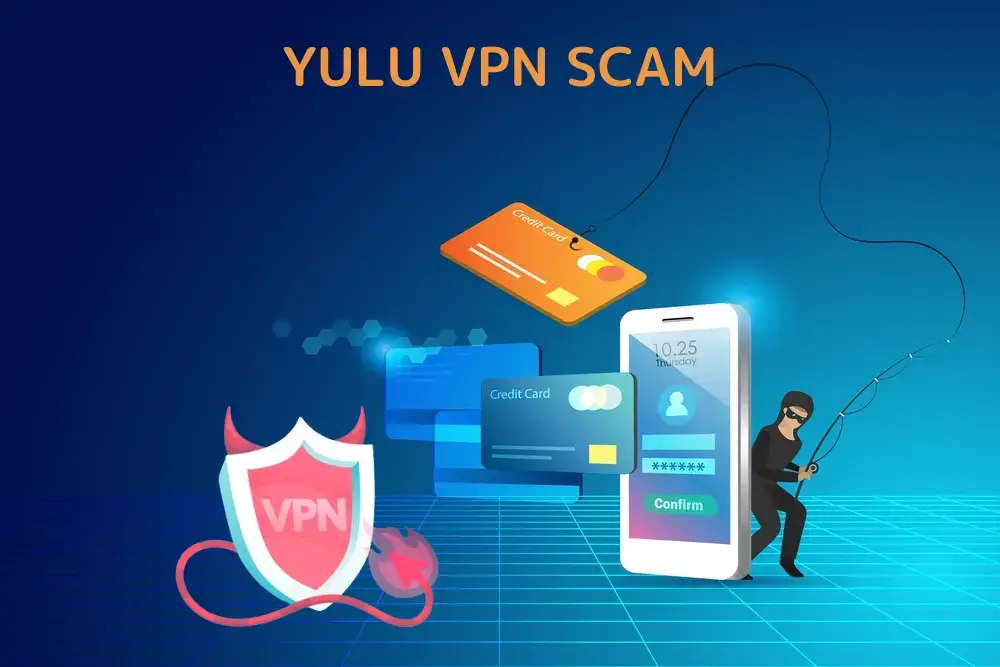YuluVPN.com is marketed as a Virtual Private Network (VPN) service provider, claiming to offer enhanced online security and privacy through data encryption and IP address masking. However, there are significant concerns regarding the authenticity and integrity of its operations. Reports and user feedback suggest that YuluVPN may not genuinely provide the level of security and privacy it advertises.
Allegations of deceptive practices by the site, including misleading claims about its service capabilities, have been noted. These practices could potentially expose users to fraud and data theft, emphasizing the importance of careful evaluation and due diligence when selecting a VPN provider. Given these concerns, users are advised to exercise caution with YuluVPN and consider more reliable and transparent alternatives for their cybersecurity needs.
Best VPN Deals of This Week
How Yulu VPN Site Scams: How Are Users Being Deceived?
Yulu VPN has employed a unique method to exploit its users under the guise of providing VPN services. Initially, the site did not directly charge users for VPN access. Instead, it displayed CPA (Cost Per Action) offers that users needed to complete to supposedly unlock VPN services. This approach often involved users engaging in activities such as filling out surveys, downloading apps, or registering for services, which would ostensibly reward them with VPN access. This setup was primarily designed to generate revenue from these actions through affiliate marketing, rather than providing any real VPN services.
Yulu VPN has shifted its approach by introducing a pricing model where users are asked to pay directly for VPN services. Despite this change, the deceptive nature of the operation remains. Users who pay for the service are likely to find that the VPN does not perform as advertised or that the promised security and privacy protections are non-existent. This strategy not only misleads users into paying for a non-functional service but also poses significant risks as personal and payment information provided during the purchase could be mishandled or fraudulently used.
Yulu VPN Data Monitoring Methods: What Happens Behind the Scenes?
Despite presenting itself as a VPN provider, Yulu VPN does not offer any actual VPN services. Behind the scenes, what appears as a VPN service is essentially a façade without any real data protection or encryption mechanisms in place. This lack of genuine service provision means that users are led to believe their data is being encrypted and securely managed, while in reality, there is no such protection occurring.
The deceptive practices extend to the way Yulu VPN handles user data. Without real VPN services, any data entered into their system—be it personal information, browsing habits, or payment details—is not secured by standard VPN protocols. This exposes users to significant risks, as their information might be collected and utilized without adequate security measures.
Furthermore, there are concerns about how this collected data is used. In scenarios like this, collected data can often be sold to third parties, including advertisers or other data brokers, without the users’ consent or knowledge. This not only breaches trust but also violates basic privacy rights.
Evaluating Verification Sites
When assessing the legitimacy of any online service, verification sites play a crucial role. These platforms, such as SafeWebTalk and ScamAdviser, provide insights into the trustworthiness of websites by analyzing various factors that indicate potential risks or scams. By evaluating Yulu VPN through these platforms, users can gain a better understanding of its reputation and safety.
For instance, SafeWebTalk often includes user reviews and detailed reports on websites, which can reveal firsthand experiences and potential issues. These reviews are valuable as they provide real-user feedback that might not be visible through simple website analysis. On the other hand, ScamAdviser utilizes an algorithm to assess the risk level of a website by checking the website’s ownership details, location, popularity, and other technical data. It provides a trust score that helps users quickly gauge the reliability of a site.
Conclusion
In an era where online security is more crucial than ever, the presence of deceptive services like Yulu VPN poses significant risks to users. The alleged practices of data theft and fraud linked with Yulu VPN highlight the importance of diligence and caution when selecting a VPN provider. Users must prioritize services that exemplify transparency, such as NordVPN and Surfshark, which are known for their robust security protocols and clear privacy policies.
Verification sites such as SafeWebTalk and ScamAdviser serve as vital tools in identifying and avoiding potentially harmful online services. They offer users a platform to verify the credibility and safety of internet services before committing any personal information or financial resources.
FAQ
-
Is Yulu VPN safe to use?
No, Yulu VPN is not safe to use. It has been associated with deceptive practices, including fraud and data theft, and lacks the fundamental security features expected of a genuine VPN service.
-
How can I verify the legitimacy of a VPN provider?
Use trusted verification sites like SafeWebTalk and ScamAdviser to check reviews and credibility, and ensure the provider is transparent about its privacy policies and security protocols.
-
What should I look for in a VPN service?
Look for robust encryption, a strict no-logs policy, positive jurisdiction, reliable speed, and responsive customer support.
-
How can fraudulent VPN services harm me?
They can expose your personal and financial information to theft, misuse your data, or expose you to cyber threats.
About the Author





